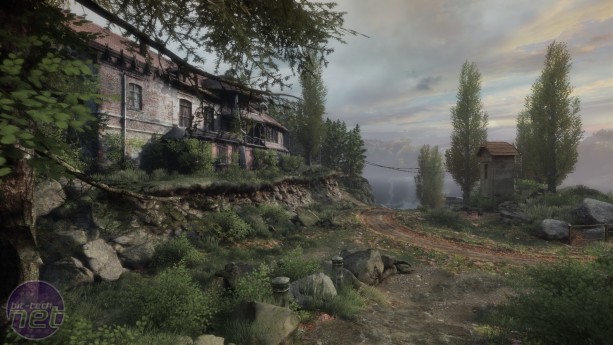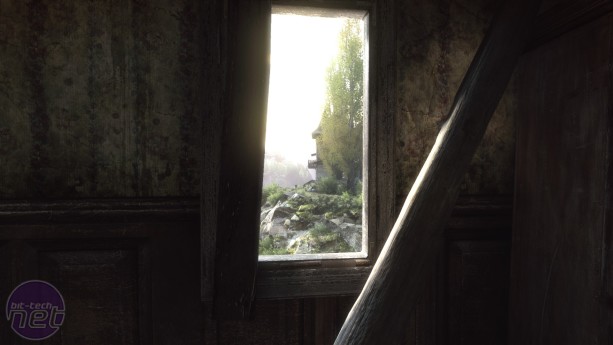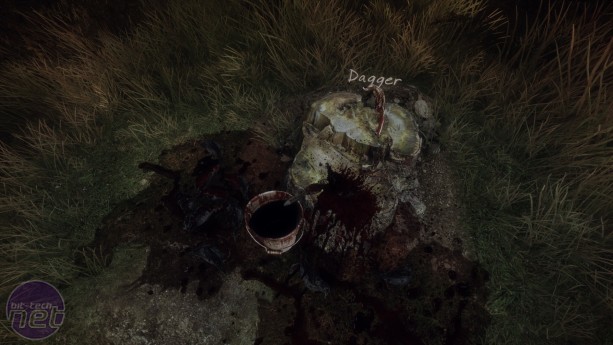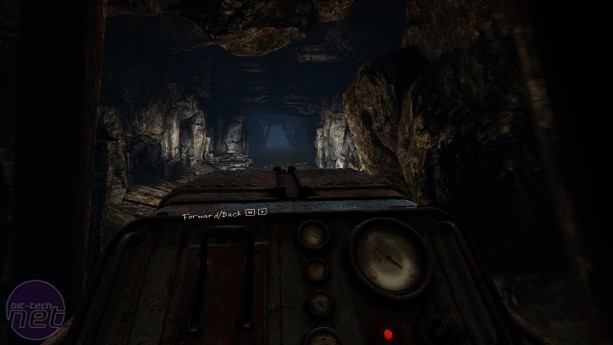
The upside of this is Ethan Carter’s world is not simply window dressing. The landscape serves a purpose at every point. Each definitive area either functions to forward the main story or give greater context to Red Creek Valley and its inhabitants. The atmosphere The Astronauts imbue into Red Creek Valley is remarkable. Although it involves supernatural elements, it’s not a horror game, not really. Instead there’s a constant feeling of tension generated by the contrast between the picturesque setting and the strange, sometimes terrible events taking place within it. All of this is brought together by a tone which is probably best described as folkloric. Red Creek Valley is a place that inspires fairytales and fables, all of which influence your journey.
Regarding what you actually ‘do’ in this world, the short answer is ‘solve puzzles’. But they aren't typical puzzles by any means. Prospero possesses the ability to psychically sense the presence of individuals through objects in the world which have been disturbed by human action, and by replacing those objects in their initial positions, he can trace the outlines of certain event onto the world, and then reconstruct the sequence chronologically.
You may be thinking this whole supernatural detective gag is highly reminiscent of the abysmal Murdered: Soul Suspect, and there are a lot of similarities, right down to the font the developers use to label objects of interest. Yet while Ethan Carter’s puzzles aren’t exactly complicated, they don’t treat you like a total idiot. There are no key/fork/spoon debacles here. It also helps that Ethan Carter’s story is precisely one hundred-thousand and six times more interesting than that of Soul Suspect’s.
I won't go over the story is any specific detail, but there are a couple of general aspects that ought to be discussed. The first is that it is, for the most part, very well written. It’s clever without being smug or self-indulgent, and is conveyed with a perfect balance of descriptive detail and narrative economy. More importantly, Ethan Carter is the first game of this genre to show us real, animated characters. It’s still a long, way from games like Half Life 2 or Mass Effect in terms of how it employs those characters. But the fact that the narrative is no longer confined to internal monologues and disembodied voices is a significant step forward.
Unfortunately, it’s a step forward made with a bullet in the foot, because Ethan Carter makes a couple of really dumb mistakes that prevent me from recommending it wholeheartedly. It claims to be a narrative experience that doesn’t hold your hand. What it means by that is it lets you completely bypass the story without noticing right up until the conclusion, whereupon it points out all the bits that you missed, and need to go back and complete in order to see the ending. It’s a choice in the same way eating cake and not eating cake is a choice. And then it forces you to eat the cake anyway, only now you must go back to the shop to buy it because you didn’t want any at the time, you awkward git.
I also hated the ending. It isn’t Mass Effect 3 levels of dreadful, because it’s consistent with a lot of the game’s themes and preceding events. But it’s also hackneyed and unnecessary, a ‘twist’ ending that made me roll my eyes and go “Oh, so that’s it, then?”. Compared to the rest of the narrative, which is a distinctly adult tale about a child, the ending feels like it was written by one.
Despite being stung at the death, and irritated by the arbitrary backtracking, I nevertheless enjoyed my time with The Vanishing of Ethan Carter. It’s a wonderfully weird walk in the woods, a stunning little world laced with mystery and intrigue. It isn't quite the genre masterpiece I was hoping it would be, but it's undoubtedly the closest example yet.
Regarding what you actually ‘do’ in this world, the short answer is ‘solve puzzles’. But they aren't typical puzzles by any means. Prospero possesses the ability to psychically sense the presence of individuals through objects in the world which have been disturbed by human action, and by replacing those objects in their initial positions, he can trace the outlines of certain event onto the world, and then reconstruct the sequence chronologically.
You may be thinking this whole supernatural detective gag is highly reminiscent of the abysmal Murdered: Soul Suspect, and there are a lot of similarities, right down to the font the developers use to label objects of interest. Yet while Ethan Carter’s puzzles aren’t exactly complicated, they don’t treat you like a total idiot. There are no key/fork/spoon debacles here. It also helps that Ethan Carter’s story is precisely one hundred-thousand and six times more interesting than that of Soul Suspect’s.
I won't go over the story is any specific detail, but there are a couple of general aspects that ought to be discussed. The first is that it is, for the most part, very well written. It’s clever without being smug or self-indulgent, and is conveyed with a perfect balance of descriptive detail and narrative economy. More importantly, Ethan Carter is the first game of this genre to show us real, animated characters. It’s still a long, way from games like Half Life 2 or Mass Effect in terms of how it employs those characters. But the fact that the narrative is no longer confined to internal monologues and disembodied voices is a significant step forward.
Unfortunately, it’s a step forward made with a bullet in the foot, because Ethan Carter makes a couple of really dumb mistakes that prevent me from recommending it wholeheartedly. It claims to be a narrative experience that doesn’t hold your hand. What it means by that is it lets you completely bypass the story without noticing right up until the conclusion, whereupon it points out all the bits that you missed, and need to go back and complete in order to see the ending. It’s a choice in the same way eating cake and not eating cake is a choice. And then it forces you to eat the cake anyway, only now you must go back to the shop to buy it because you didn’t want any at the time, you awkward git.
I also hated the ending. It isn’t Mass Effect 3 levels of dreadful, because it’s consistent with a lot of the game’s themes and preceding events. But it’s also hackneyed and unnecessary, a ‘twist’ ending that made me roll my eyes and go “Oh, so that’s it, then?”. Compared to the rest of the narrative, which is a distinctly adult tale about a child, the ending feels like it was written by one.
Despite being stung at the death, and irritated by the arbitrary backtracking, I nevertheless enjoyed my time with The Vanishing of Ethan Carter. It’s a wonderfully weird walk in the woods, a stunning little world laced with mystery and intrigue. It isn't quite the genre masterpiece I was hoping it would be, but it's undoubtedly the closest example yet.
-
Overall83 / 100


MSI MPG Velox 100R Chassis Review
October 14 2021 | 15:04













Want to comment? Please log in.